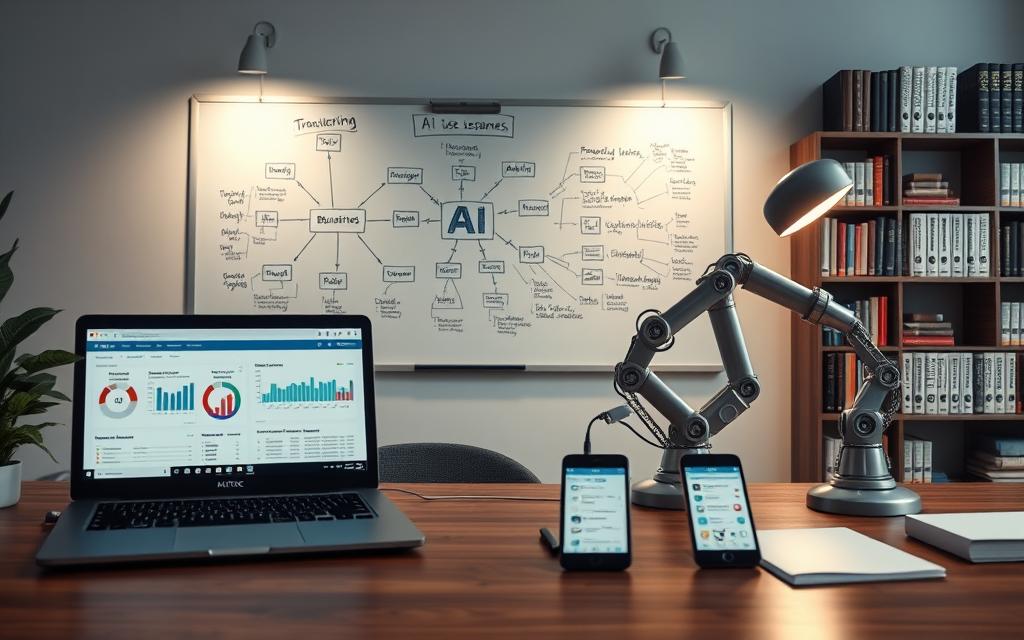Artificial intelligence is reshaping industries at a pace comparable to the Industrial Revolution and the digital age. As Bill Gates noted on GatesNotes, “We’re only at the beginning of what AI can accomplish.” This transformative technology is no longer reserved for tech giants; it’s accessible to organizations of all sizes.
According to Accenture, 84% of C-suite executives believe AI drives growth. The global AI market, valued at $62 billion by Grand View Research, underscores its momentum. From improving operational efficiency to unlocking customer insights, the potential is vast.
Some worry about job displacement, but history shows that technological advancements create new opportunities. Early adoption of AI tools and systems can help companies stay ahead of competitors. By leveraging data and technology, businesses can enhance decision-making and streamline processes.
Understanding the Role of AI in Modern Business
Modern enterprises are increasingly relying on AI to drive efficiency and growth. This technology is no longer a futuristic concept but a practical tool reshaping industries. From automating tasks to providing actionable insights, AI is becoming an integral part of business strategies.
AI as a Transformative Force
AI’s impact on business is comparable to the shift graphic designers experienced with digital tools. It’s not about replacing human effort but enhancing it. For example, customer service chatbots now handle routine inquiries, freeing up human agents for complex issues.
McKinsey reports that 56% of companies have adopted AI in 2023, up from 50% in 2020. This growth reflects the technology’s potential to improve decision-making and operational efficiency.
Overcoming Misconceptions About AI
One common fear is job displacement. However, history shows that technological advancements create new roles. AI systems are designed to complement human work, not replace it. By automating repetitive tasks, employees can focus on higher-value activities.
“AI is not about taking jobs; it’s about transforming them.”
AI’s Potential to Enhance Business Operations
AI excels in analyzing vast amounts of data. Forbes highlights that data growth has increased by 5000% since 2010. AI systems can process this data to uncover trends and insights that drive smarter decisions.
Predictive capabilities are another strength. AI optimizes supply chains, detects fraud, and improves customer interactions through natural language processing. Accenture found that companies using AI outperform their peers in key business metrics.
| AI Application | Business Benefit |
|---|---|
| Data Analysis | Uncover actionable insights |
| Predictive Analytics | Optimize supply chains |
| Chatbots | Enhance customer service |
| Fraud Detection | Reduce financial risks |
AI’s ability to analyze behavior and predict trends makes it a powerful tool for companies aiming to stay competitive. By integrating AI into their systems, businesses can unlock new levels of efficiency and innovation.
Practical Ways Businesses Can Experiment with AI
AI-powered tools are transforming everyday operations across industries. These applications are not just for tech giants but are accessible to organizations of all sizes. By integrating AI into workflows, companies can unlock new levels of efficiency and innovation.

Leveraging AI for Market Research and Predictive Analytics
AI excels in analyzing customer behavior and market trends. Tools like Google Analytics 4 use predictive analytics to optimize inventory and forecast demand. This helps companies make data-driven decisions and stay ahead of competitors.
For example, sentiment analysis tools can process thousands of social media mentions daily. This provides valuable insights into customer preferences and helps refine marketing strategies.
Automating Routine Tasks to Boost Efficiency
AI is a game-changer for automating repetitive tasks. HR departments, for instance, use AI resume screening to reduce hiring time by 75%. Accounting teams benefit from tools like Wave, which automates receipt scanning and invoicing.
By streamlining these processes, employees can focus on higher-value activities. This not only improves efficiency but also enhances job satisfaction.
Enhancing Customer and Employee Relationships with AI
AI-powered chatbots, like Tidio, improve response times by 40%. This ensures customers receive timely support, boosting satisfaction. Similarly, natural language processing in CRM systems like HubSpot enables personalized email campaigns.
For employees, AI tools can analyze workloads and provide recommendations for better time management. This fosters a more productive and engaged workforce.
“AI is not about replacing human effort but enhancing it.”
For more insights on integrating AI into your operations, check out this resource.
Tools and Resources for AI Experimentation
AI experimentation starts with selecting the right resources and tools. Whether you’re a small business or a large enterprise, the right tools can make all the difference. From free platforms to premium services, there’s something for every budget and need.
AI Tools for Small Businesses
Small businesses often face budget constraints, but there are cost-effective tools available. For example, HubSpot CRM offers a free tier for managing customer relationships. GPT-3 is another powerful option for generating content quickly and efficiently.
For product recommendations, Algolia provides advanced search capabilities. These tools help small businesses compete with larger players by improving performance and customer satisfaction.
Selecting the Right AI Tools for Your Business Needs
Choosing the right tools depends on your specific needs. Start by identifying key areas for improvement, such as data analysis or customer support. A tool selection matrix can help match your requirements with available solutions.
For example, Adobe Sensei is ideal for enterprises needing advanced machine learning capabilities. On the other hand, Semrush combined with ChatGPT workflows can optimize SEO content for smaller teams.
Developing AI Skills Within Your Team
Investing in learning is crucial for successful AI adoption. Programs like Wharton Online’s AI certification offer measurable KPIs for skill development. A 6-month upskilling plan can transform your team’s capabilities.
For example, integrating Google Analytics with ChatGPT can create a robust data pipeline. This empowers teams to make informed decisions based on real-time trends.
“AI skills are the foundation of future-proof organizations.”
By focusing on learning and the right tools, companies can unlock the full potential of AI and drive innovation.
Conclusion: Embracing AI for Future Success
The rapid evolution of artificial intelligence is reshaping the way companies operate today. As Bill Gates noted, we’re only at the beginning of what this technology can achieve. With a projected 40.2% market growth through 2028, adopting AI is no longer optional—it’s a competitive necessity.
To get started, begin small, measure results, and scale strategically. Companies without AI strategies risk a 23% revenue decline by 2025. Start by auditing three key processes this quarter to identify AI potential.
Empower your team by enrolling in programs like Wharton’s AI for Business. Leverage tools and systems to enhance efficiency and deliver better services to customers. The future belongs to those who embrace machine learning and data-driven insights today.
FAQ
What role does AI play in modern business operations?
AI acts as a transformative force, enhancing efficiency, automating tasks, and providing actionable insights through data analytics. It helps companies make informed decisions and improve customer experiences.
How can predictive analytics benefit my business?
Predictive analytics uses machine learning to analyze customer behavior and market trends. This helps businesses anticipate needs, optimize marketing strategies, and improve overall performance.
What are some practical ways to integrate AI into daily tasks?
Businesses can automate routine tasks like scheduling, data entry, and customer service using tools like chatbots. This frees up time for teams to focus on strategic initiatives.
Which AI tools are suitable for small businesses?
Tools like HubSpot for marketing automation, Zendesk for customer service, and Google Analytics for data insights are ideal for small businesses. They are cost-effective and easy to implement.
How can AI improve customer relationships?
AI-powered chatbots and natural language processing tools provide personalized customer service. They analyze behavior to offer tailored recommendations, enhancing satisfaction and loyalty.
What steps can I take to develop AI skills within my team?
Encourage learning through online courses, workshops, and certifications. Platforms like Coursera and LinkedIn Learning offer resources to build expertise in AI and machine learning.
How do I choose the right AI tools for my business needs?
Identify your goals, such as improving efficiency or analyzing customer behavior. Research tools that align with these objectives and offer scalability for future growth.









